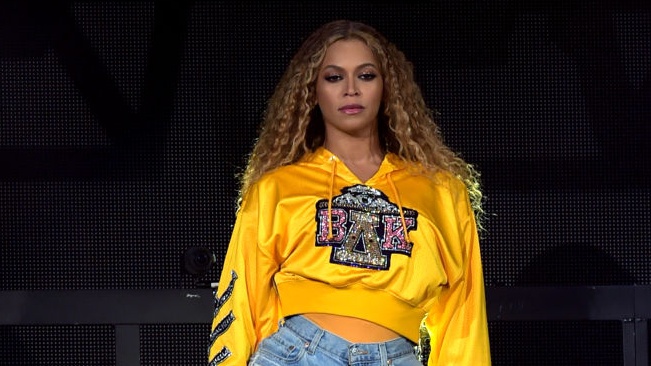Beyoncé's footprint on the English language and world pop culture is undeniable. She had us all screaming "surfbort" for more than a year after Lemonade was released.
To honor the superstar's 38th birthday on Wednesday, Dictionary.com
released a small encyclopedia of her favorite phrases and lyrical inventions named "A-'Bey'-C: Learn The Lingo Of Beyoncé."
Oh hey, it's #BeyDay. Do you know your A-“Bey”-Cs? https://t.co/vUjPH6EIiv
— Dictionary.com (@Dictionarycom) September 4, 2019
The first slide reminds newcomers that the Beyhive is pronounced bee-hive and not phonetically. Origins of the word were traced back to 2009, but Dictionary.com says fans really started using the word Beyhive after Beyoncé's web designer sent out a call on Twitter asking for ideas on what the fan section of the star's website should be called. From then on, the Beyhive truly took form.
The rest of this list includes dozens of words or phrases that started trending on Dictionary.com after Beyoncé used them in an interview, song or live show.
Just by filming a music video at the Louvre in 2018, Beyoncé spiked searches for the museum on the site. That video also sent the internet crazy over another word.
.@Beyonce & @S_C_ fans went apes–t for their music video this week … and helped one word trend on https://t.co/EoMLt7nGp1
#WordsOfTheWeek
#Beyonce
#TheCartershttps://t.co/Xsij4x9iKi
pic.twitter.com/NFJaYDBriq— Dictionary.com (@Dictionarycom) June 23, 2018
After the release of the 2016 visual album Lemonade, searches for "Lemonade braids" skyrocketed.
"With Lemonade, Beyoncé not only had a top-selling and socially incisive album, but she also sported a distinctive hairstyle in the video for 'Formation.' These came to be called Lemonade braids, and women asked for them in hair salons for years to come," the website stated.
"Designed by Kim Kimble, Lemonade braids are very long cornrows with a deep side part that makes them cascade over one shoulder. Queen Bey wore hers in a blond color, though imitators style theirs in various colors," the site continued.
Even slang like FUPA saw an 18,150% increase in searches on the site after Beyoncé spoke to Vogue in September 2018 about the changes her body has undergone as she’s aged and had children.
"… right now, my little FUPA and I feel like we are meant to be," she told the fashion magazine, sending the internet scouring the web for definitions of the term.
Dictionary.com also notes that Beyoncé repopularized the use of the word Bugaboo twice throughout her long career. They say the word dates all the way back to the late 1800s and was "slang for someone who is a pesterer or nuisance, especially in a sexual context."
After Destiny’s Child released their song “Bug a Boo,” the term came back into the cultural zeitgeist. Beyoncé had the internet straining Dictionary.com's servers when she included the word more than a decade later in her Beychella performance.
The website added that Beyoncé managed to turn "Bootylicious" into a body-positive term after decades of carrying a negative connotation.
The music icon also had people sifting through the website trying to understand what "Becky (with the good hair)" meant.
The Houston, Texas, native also coined the term "surfbort," which skyrocketed up the Dictionary.com rankings when she said it in her 2013 smash hit “Drunk in Love.”
"Like most things with Beyoncé, one word can carry so many different meanings and implications. Surfbort is yet another example," the website read.
"Many people hear surfboard as 'surfbort' (which may be due to an idiosyncrasy or part of the phonology of Black English). Searches for the term skyrocketed. Surfbort-themed merchandise and memes, as ever, spread. Definitions even appeared on Urban Dictionary defining 'surfbort' as a sexual act," the website continued.
